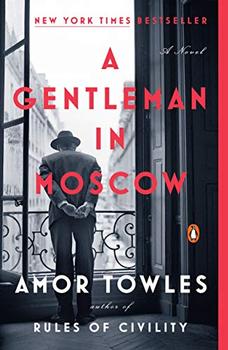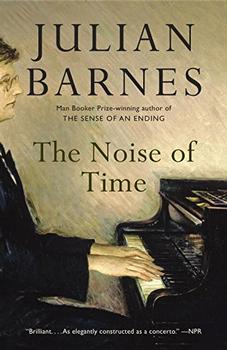Summary | Excerpt | Reviews | Beyond the book | Read-Alikes | Genres & Themes | Author Bio

A Novel
by Simon Sebag MontefioreOnce I start a book, I almost always finish it, no matter how bad it may seem at
first, as there's always the chance that might, just might, get better.
Nine times out of ten my initial impression was correct, and the book ended up
being a waste of time. Every now and then, though, my determination is rewarded.
Such is the case with Simon Montefiore's first novel, Sashenka, the
second half of which is a brilliantly written, impeccably researched work of
historical fiction.
 The first third of Sashenka is set in 1916-1917, in a St. Petersburg on
the verge of revolution. It's a perfect time and place to use as the setting for
a historical fiction novel, a fascinating era with a wealth of intrigue,
politics, corruption, and a whole host of other historic circumstances and
people that could be incorporated into a marvelous story; but Montefiore does not
take advantage of the time or place. Although his main character is heavily
involved in fomenting what is ultimately a bloody revolution, this section of
the book lacks any sense of drama or danger. Montefiore does do an outstanding
job of describing St. Petersburg and its society, but it's not adequate to make
the rest of this section come to life; it's too static, added to which the
dialog is melodramatic and puerile, and the characters have no depth or
originality. If there were any way to skip this section and still understand the
rest of the book, I'd recommend doing so, but unfortunately the reader must wade
through this almost painfully bad section to reach the real meat of the novel.
The first third of Sashenka is set in 1916-1917, in a St. Petersburg on
the verge of revolution. It's a perfect time and place to use as the setting for
a historical fiction novel, a fascinating era with a wealth of intrigue,
politics, corruption, and a whole host of other historic circumstances and
people that could be incorporated into a marvelous story; but Montefiore does not
take advantage of the time or place. Although his main character is heavily
involved in fomenting what is ultimately a bloody revolution, this section of
the book lacks any sense of drama or danger. Montefiore does do an outstanding
job of describing St. Petersburg and its society, but it's not adequate to make
the rest of this section come to life; it's too static, added to which the
dialog is melodramatic and puerile, and the characters have no depth or
originality. If there were any way to skip this section and still understand the
rest of the book, I'd recommend doing so, but unfortunately the reader must wade
through this almost painfully bad section to reach the real meat of the novel.
The story leaves St. Petersburg soon after the Revolution, fast-forwarding
twenty-two years. Sashenka is married with children, and she is among the party
elite. Initially the reader may experience frustration that the author chose to
omit the intervening years. Not only does the reader want to know how Sashenka
reached this point in her life, but there's the sense that the reader has missed
all the action, as the story resumes after Lenin's death, the ensuing power
struggles and Stalin's purges. This disappointment is short-lived, however, as
the story quickly loses it superficiality and delves into the paranoia of the
Stalin regime. The reader gets so wrapped up in the story's present that he or
she no longer cares about its past. This section of Sashenka bears so
little resemblance to its earlier chapters that the reader is tempted to think
it could have been written by a different author. Montefiore's literary talents
soar here as he constructs a credible, moving heroine thrust into absolutely
terrifying circumstances. Sashenka's emotions are palpable and utterly
convincing. The author creates a level of heart-pounding suspense difficult to
achieve and rarely found in historical fiction novels. The book becomes
completely absorbing from this point onward.
The final chapters are set in 1994, another fifty-five years in the future.
While not as breathlessly exciting as the previous section, it's still involving
to the point that the reader will be reluctant to put the book down. Montefiore
does a fine job portraying the complexities of deciphering Russia's past, still
a daunting task decades after Stalin's death. The author's personal experience
in obtaining information in such a secretive environment is evident, as is his
understanding of the Russian psyche that has created such an atmosphere.
Sashenka is, in short, a remarkable novel with an unforgettable
protagonist. I found myself haunted by this book for quite some time after I
turned the final page. Historian Montefiore shows much promise as a novelist,
particularly if he can avoid the banalities pervading the early sections of
this, his first fictional attempt. This book is sure to please readers
interested in Russia's recent history.
Image: A photograph of Rasputin believed to be from 1908.
About the Author
 Simon Sebag Montefiore is a historian of Russia and
author of Potemkin: Catherine the Great's Imperial Partner;
Stalin: The Court
of the Red Tsar; and the bestselling
Young Stalin, awarded the 2007
Costa Biography Award and the Los Angeles Times Book Prize for Biography. Fellow
of the Royal Society of Literature, Montefiore lives in London with his wife,
the novelist Santa Montefiore, and their two children.
Simon Sebag Montefiore is a historian of Russia and
author of Potemkin: Catherine the Great's Imperial Partner;
Stalin: The Court
of the Red Tsar; and the bestselling
Young Stalin, awarded the 2007
Costa Biography Award and the Los Angeles Times Book Prize for Biography. Fellow
of the Royal Society of Literature, Montefiore lives in London with his wife,
the novelist Santa Montefiore, and their two children.
![]() This review was originally published in The BookBrowse Review in January 2009, and has been updated for the
November 2009 edition.
Click here to go to this issue.
This review was originally published in The BookBrowse Review in January 2009, and has been updated for the
November 2009 edition.
Click here to go to this issue.

If you liked Sashenka, try these:

by Amor Towles
Published 2019
From the New York Times bestselling author of Rules of Civility - a transporting novel about a man who is ordered to spend the rest of his life inside a luxury hotel.

by Julian Barnes
Published 2017
A compact masterpiece dedicated to the Russian composer Dmitri Shostakovich: Julian Barnes's first novel since his best-selling, Man Booker Prize–winning The Sense of an Ending
Finishing second in the Olympics gets you silver. Finishing second in politics gets you oblivion.
Click Here to find out who said this, as well as discovering other famous literary quotes!
Your guide toexceptional books
BookBrowse seeks out and recommends the best in contemporary fiction and nonfiction—books that not only engage and entertain but also deepen our understanding of ourselves and the world around us.